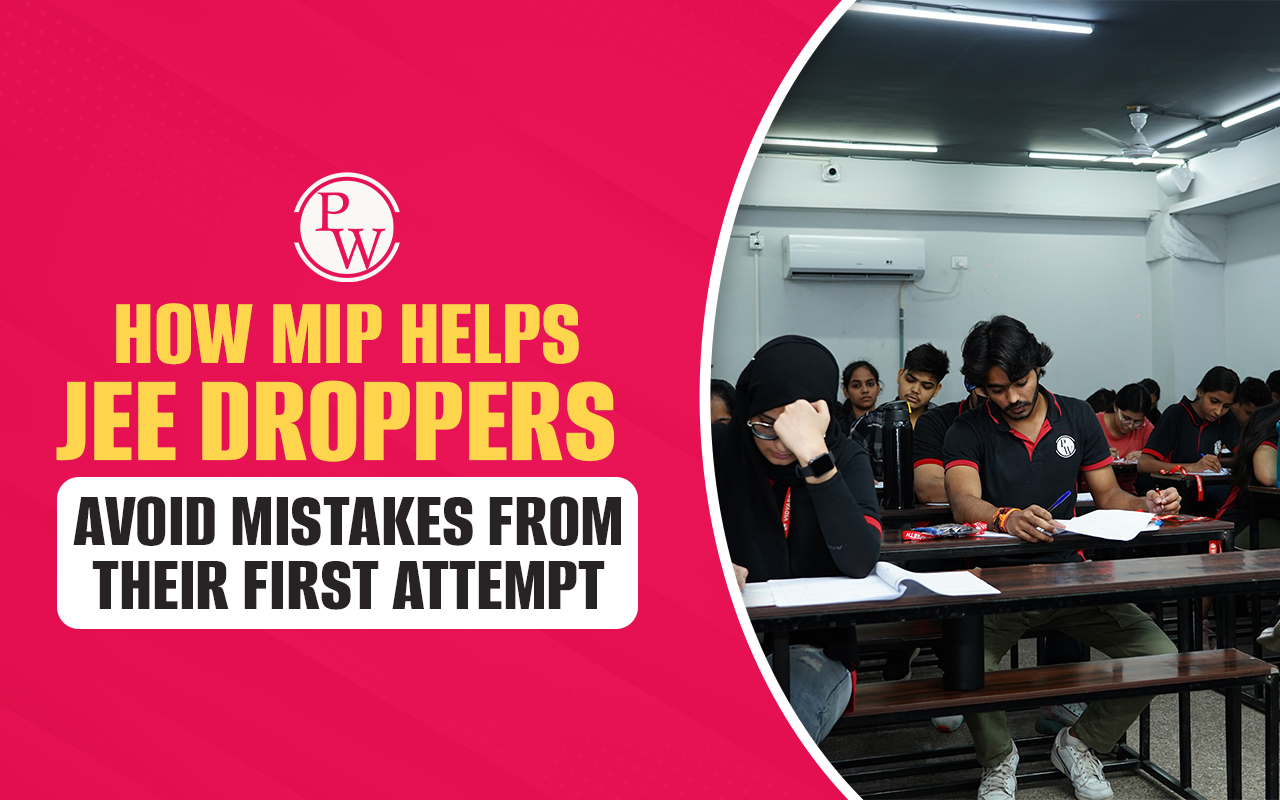

Top 10 Reasons You Scored Low in NEET: Scoring low in NEET is disappointing, but identifying the low NEET score is the first step toward improvement. Preparation for NEET requires months of preparation, but if your hard work doesn't match the results, you need to analyze your performance.
Understanding why students score low in NEET is crucial because most errors are avoidable with the right strategies. Mistakes like poor time management and weak conceptual clarity, add up to a loss in marks. But with targeted practice and the right support systems, these issues can be corrected well before the actual exam.
Marks Improvement Program (MIP) by Physics Wallah combines offline practice, All India Test Series (AITS), real exam simulations, doubt support, and performance tracking. MIP directly addresses the common mistakes in NEET exam preparation.
Low NEET Score Reasons
It is important to know why students score low in NEET, as recognizing those mistakes and trying to avoid them can help you score well. There are some recurring NEET preparation errors that every student faces. Below are the 10 most common reasons for low NEET marks and how they impact your score:
-
Students sometimes fail to divide their time in a better way between Physics, Chemistry, and Biology. Spending too long on one section leaves others incomplete, resulting in lost marks despite knowing the answers.
-
Simply memorizing the concepts isn’t enough for NEET preparation. NEET requires aspirants to have conceptual clarity. Without understanding the core concepts, aspirants struggle with application-based and HOTS questions, which lowers accuracy.
-
Some students underestimate the importance of NEET practice tests. Without taking regular mocks, you cannot work on their weak areas. Students must take regular mock tests and solve them under timed conditions, i.e., solve 180 questions in 3 hours.
-
Skipping NEET Previous Years’ Papers is a big mistake. NEET often repeats question patterns, and ignoring them reduces understanding with the exam structure, which can lead you to lose marks in the exam.
-
NCERT is essential, but NEET also tests analytical problem-solving. Students who don’t practice advanced modules or test series often miss tricky application-based questions.
-
Exam pressure causes panic, leading to silly mistakes. Even well-prepared students lose marks when they cannot manage their stress levels under real exam conditions.
-
It is important to focus on daily revision. Aspirants must do daily revision after completion of chapters and even the course. You should follow a structured plan, including time for revision. If you avoid revision, you may forget formulas, diagrams, or factual data during the exam.
-
Negative marking is a major reason for low scores. Blind guessing without proper elimination strategies leads to a drop in overall marks.
-
Attempting tests without proper mock test score interpretation wastes effort. Students don’t identify their weak areas and keep repeating the same mistakes.
-
Skipping practice sessions or irregular study breaks, consistency. NEET requires disciplined preparation; inconsistency often leads to average performance despite potential.
How MIP Helps Fix These NEET Preparation Errors?
The Marks Improvement Program (MIP) is specially created to target these weak points and help students overcome the reasons for low NEET marks. It simulates real exam conditions while providing structured support and feedback for consistent improvement.
Here’s how the MIP handles every challenge:
-
All India Test Series (AITS): It offers a national-level ranking system with AIR, performance analysis, and questions designed by experienced faculty. It helps students manage time and improve accuracy.
-
Real Test Experience: The mode of conduction of JEE is through offline mode. The test series in this program replicate the actual NEET exam environment. It helps students reduce anxiety and improves performance under real pressure.
-
Doubt Support (for selected plans): Weekly 8-hour offline doubt-solving sessions ensure students don’t leave concepts unclear, fixing weak conceptual understanding.
-
National Ranking and Performance Analysis: NEET mock test feedback gives students clarity about where they stand and how to improve.
-
Structured Revision and Planner: A scheduled series of tests and batch-wise planning avoids poor revision strategies.
-
Video Solutions and Reattempts: Detailed explanations and the option to reattempt papers on the PW app allow deeper understanding and consistent improvement.
MIP Program Details for NEET (Pricing and Offerings)
To make sure every student can access the right support system, MIP offers flexible plans for 11th, 12th, and droppers at cost-effective prices. Each plan is structured to provide a mix of batch tests, AITS, Real Tests, and doubt support depending on the student’s requirement..
|
MIP Program Details for NEET (Pricing and Offerings) |
|||
|
Program |
Listing MRP (incl. GST) |
New Payable Price (incl. GST) |
Offerings |
|
MIP (Doubt + Test + Real Test) – 11th/12th/Dropper NEET |
₹23,000 |
₹13,999 |
Batch Test + AITS + Doubt Support + Real Test [4 Tests] |
|
MIP (Test + Real Test) – 12th & Dropper NEET |
₹14,000 |
₹7,499 |
Batch Test + AITS + Real Test [4 Tests] |
|
MIP (Test + Real Test) – 11th NEET |
₹11,000 |
₹5,499 |
Batch Test + AITS + Real Test [4 Tests] |
Low NEET Score Reasons vs. MIP Solutions
While the features and pricing of MIP make it one of the most comprehensive programs, it’s equally important to see how directly it addresses the common mistakes in NEET exam preparation. The table below quickly maps the reasons for low NEET marks with the exact way MIP solves them, so students can clearly understand the impact.
|
Low NEET Score Reasons vs. MIP Solutions |
|
|
Low NEET Score Reasons |
How MIP Fixes It |
|
Lack of time management in NEET |
AITS builds time discipline with 3-hour structured mocks |
|
Weak conceptual understanding NEET |
Doubt Support from expert faculty + detailed solutions |
|
Not practicing enough mocks |
Regular batch tests + Real Test Series (NTA-simulated) |
|
Ignoring PYQs & patterns |
Tests curated by expert teachers based on latest NEET trends |
|
Stress and anxiety |
True exam hall experience reduces nervousness |
|
Poor revision strategy |
Scheduled test planner ensures timely revision |
|
Negative marking from guesswork |
Practice with detailed analysis to improve elimination skills |
|
Not analyzing feedback |
Comprehensive mock test feedback & score interpretation |
|
Inconsistency |
Structured planner + reattempt options build consistency |
Top 10 Reasons Scored Low in NEET FAQs
What are the main low NEET score reasons?
How does MIP help improve mock performance?
Why do students need a Real Test before NEET?
Can MIP help with weak conceptual understanding in NEET?













